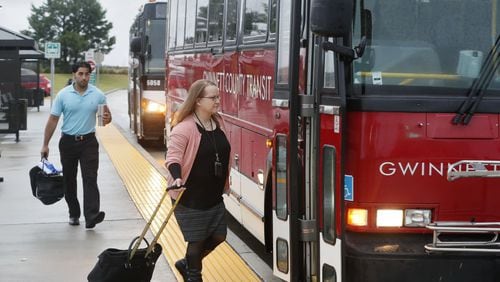One after another, they left their seats, stood before the dais and pilloried the Gwinnett County commission.
Politicos, public transit advocates and everyday people spent close to an hour admonishing Gwinnett's highest elected body — not about its decision to perhaps enter into a relationship with MARTA, that Atlanta-based transit authority so long maligned in the suburbs, but for putting off the required public referendum on the matter until next year.
“The only people that this benefits,” Lawrenceville resident Susan Gamble said, “are road builders.”
For sure, there are those against expanding public transit in the county, a proposition that in the past has evoked fear about bad elements from “the city” catching a ride up to Gwinnett.
But Wednesday’s outcry — about the decision to hold a vote in March instead of November, when a heavy turnout for gubernatorial and Congressional races is expected — is a stark example of how the once homogeneous county has changed in the decades since its last MARTA vote.
Since 1990, chunks of Gwinnett have gone not only from farmland to suburbs but from suburban subdivisions to apartments and townhomes. The population has swelled to nearly one million people, clogging even greatly expanded interstates. New job centers within the county draw as many commuters into Gwinnett as the Atlanta area draws out. The population has gotten younger, more diverse and more Democratic – all groups apt to favor the convenience of public transit. The county has also seen an influx of people from places like the Northeast, where transit is a fact of life.
Taking all of that into consideration, it’s hardly surprising that Gwinnett would suddenly find itself at the forefront of the suburbanization of mass transit in Atlanta.
“It’s a little disappointing that there’s as much push-back as there is,” Commission Chairman Charlotte Nash said of last week’s meeting. “I’m just very, very happy to get to the point that we’re able to approve the contract and move forward.”
It’s been a long, bumpy ride.
‘Such a racial deal’
Gwinnett County Transit currently consists of six local bus routes that run almost exclusively on a single end of the county, as well as five express routes to locations inside I-285.
Tiffany Mensah, 33, of Duluth, rides one of the latter several days a week. It carries her from the Indian Trail Park and Ride to inside the Perimeter, past the 300,000 or so cars that travel I-85 in Gwinnett each day. She works at the Centers for Disease Control and Prevention.
“Being a native New Yorker,” Mensah said, “I’m used to jumping on a bus or train to get anywhere. It’s frustrating to live in a city so congested with traffic because folks don’t want to vote in their own best interest.”
Gwinnett County has shot down MARTA multiple times, though it hasn’t held a vote in nearly 30 years.
In November 1971, when the voters of Fulton and DeKalb counties voted to approve a new sales tax to fund MARTA, Clayton and Gwinnett overwhelmingly rejected it.
Gwinnett’s Board of Commissioners, then representing a county of less than 75,000, declined MARTA’s offer to hold another referendum in 1972. It would be 1990 before a new vote was called.
By then, Gwinnett’s population — and the divisive rhetoric surrounding MARTA — had both grown exponentially.
“I knew it wasn’t going to pass in 1990,” Wayne Mason, real estate tycoon and former Gwinnett commission chairman, told The Atlanta Journal-Constitution earlier this year. “It was all about MARTA. MARTA was such a racial deal.”
At a 1990 public forum in Lilburn, few publicly expressed any racial bias. Concerns centered around crime and wariness of the city of Atlanta:
“That place has a reputation for murder and rape — the wrong people,”one Gwinnett resident said. “We don’t need ‘em, we don’t want ‘em.”
Said another: “I rode MARTA five years ago, and no offense to anyone, but there were three young black men riding who were polishing switchblades. I said if I ever get off MARTA, I will never get on again.”
Transit advocates at the time were quick to say that it was all coded language for fear of more black people ending up in Gwinnett. While the county had north of 350,00 residents, it remained 90 percent white.
The referendum, held three months later, failed. Seventy percent of voters chose “no.”
After that, MARTA became a verboten concept in Gwinnett County politics, and would remain so for a quarter century. But the momentum now appears to be flowing in a different direction.
In a public survey completed last October as part of the county's transit development plan, 65 percent said they would "strongly support" or "somewhat support" a new transit-funding sales tax.
About 55 percent of those polled in a later phone survey said they would support such a sales tax.
Little objection was expressed during a round of public meetings on the county’s recently adopted transit plan, and there has been no organized opposition — though a March referendum may give one more time to come together.
“I think Gwinnett voters are ready to vote for a much more organized transportation system,” said Emory Morsberger, a longtime developer and former Gwinnett representative on MARTA’s board. “… People are tired of sitting in traffic. It’s eating up a huge amount of time, and it’s hurting people’s quality of life.”
Make no mistake. There is resistance. The most recurring objections appear to be about not wanting to pay more taxes, in general, and the perception that only part of the county would be served.
County Commissioner John Heard recently called MARTA a "boondoggle." Colleague Tommy Hunter voted against the MARTA contract on Wednesday, calling the entire idea "misguided."
“The discussion I’ve heard down in my area is most people don’t see the benefit if you don’t live on the I-85 corridor,” state Rep. Brett Harrell, a Republican from Snellville, said. “Why would somebody in Snellville or Grayson or Loganville vote for that?”
Lilburn-area resident Brenda Lee, a longtime local gadfly, recently penned a Facebook post with the following all-caps message: “TAXED ENOUGH ALREADY! NO MARTA!”
Gwinnettians currently pay 6 cents per dollar in sales tax. The transit tax would make it 7 cents.
“They’ve made a mess of the land-use plan by changing it so consistently, and created the mess that is now our traffic, without consideration for the infrastructure,” Lee told the AJC. “And so now they’re trying to push MARTA down our throats.”
‘Transit Referendum 101’
The county has seen much change. Of Gwinnett’s nearly 1 million residents, roughly 60 percent are black, Latino or Asian residents. More than a quarter of are foreign born.
The longtime Republican stronghold is starting to lean blue. The county voted for Hillary Clinton over Donald Trump in 2016, the first time it had selected a Democrat since 1976. It’s now considered a battleground in everything from local elections to Congressional ones.
Democrats alleged this week that the latter played a role in the all-Republican Gwinnett commission's decision to hold a transit referendum all by itself, rather than as an item on a November ballot filled with high-profile races — the better to not drive any more Democratic turnout than necessary.
And while transit opinions aren’t strictly divided along partisan lines, such affiliations will likely play a significant role in Gwinnett’s referendum. That may particularly be the case if turnout is low.
Chuck Warbington — Lawrenceville’s city manager, the chairman of Gwinnett’s planning commission and a longtime transit advocate — thinks Gwinnett voters will pass a referendum, even in March. He predicted a 55-45 margin.
“Folks are looking for options other than just paving,” Warbington said. “I think folks realize that, you go from a two-lane [road] to a four-lane, that gives you about five years, and then it’s going to be filled up again. … We have got to stop providing suburban solutions to urban issues.”
Others are less confident.
“‘Transit Referendum 101’ says, to be successful, have it in a general election, not a special election,” said Colleen Kiernan, the executive director of advocacy group Georgia Conservation Voters. “In the series of mistakes that people can make in transit referendums, that was basically rule number one. So we’re off to a bad start.”
WHY IT MATTERS
Attitudes about public transit have begun to change all around metro Atlanta.
Clayton County: Voted to join MARTA in 2014, which currently operates bus service. MARTA recently recommended the expansion of commuter rail into the county.
Cobb County: Considering holding a countywide referendum on joining the recently created regional transit authority, or confining such a vote to a special transit district.
Gwinnett County: Has approved a contract with MARTA and plans to hold a referendum in March.
GWINNETT’S TRANSIT PLAN
The multibillion-dollar transit development plan recently adoped by Gwinnett is intended to guide the future of mass transit in the county. Recommendations include undertaking the following projects over the next 30 years:A 4.5-mile heavy rail extension from the Doraville MARTA station to a new "multimodal hub" near the Norcross-area intersection of Jimmy Carter Boulevard and I-85.
- A bus-rapid transit (BRT) line between the Norcross hub and the Infinite Energy Center in Duluth.
- More BRT lines extending east near Ga. 316 and into downtown Lawrenceville, and north down Pleasant Hill Road before stretching west through Berkeley Lake and Peachtree Corners.
- New local bus routes down U.S. 78 into DeKalb County.
- Several new park-and-rides for express bus service to the Atlanta area.
- An extensive corridor for rapid bus service, which is different from BRT in that it doesn't operate in dedicated lanes, throughout the entire county.
WHY IT MATTERS
Attitudes about public transit have begun to change all around metro Atlanta.
Clayton County: Voted to join MARTA in 2014, which currently operates bus service. MARTA recently recommended the expansion of commuter rail into the county.
Cobb County: Considering holding a countywide referendum on joining the recently created regional transit authority, or confining such a vote to a special transit district.
Gwinnett County: Has approved a contract with MARTA and plans to hold a referendum in March.
About the Author









